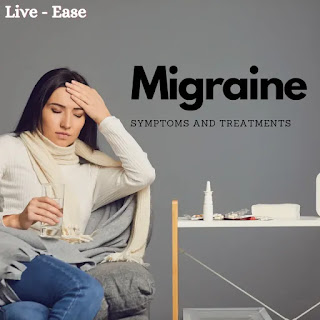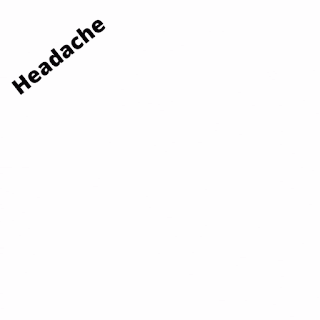Everyone has complains of headache at least once in their life, but
do you know what migraine is? And How it is different from normal headache?
So come lets know about it.
What is migraine? What are the symptoms?
Migraine is a complex neurological disease that impact more
than billion people all over the world.
Our neurons work to understand the things around us, they are the
sensory nerves of our body that send signals to the spinal cord and brain.
And due to disturbances in these neurotransmitters or not
being able to function properly, we have a complaint of migraine.
Due to mutation in the part of our DNA which we also called
genes our transmitters become hypersensitive, which could be another reason for migraine.
People with migraine may also have anxiety, depression, epilepsy,
hypothyroidism, irritable bowel syndrome, pelvic floor pain, fibromyalgia
Sjogren's disease
What Migraine feels like?
Migraine headaches are pulsatile and often unilateral head
pain that is often disabling and occurs with associated symptoms.
They are unilateral which means they usually occur on one
side of the head and they're pulsatile which means that they are pounding in
nature.
so they're a pounding or throbbing type of headache and it's
believed that the underlying pathophysiology of migraine headaches may be due
to abnormal cerebral vasodilation or neuronal impairments.
How Migraine is caused?
Abnormal cerebral vasodilation is where the vasculature in
your head becomes dilated abnormally and then there's also this possible issue
of neuronal impairments.
As well as these will
tie into some of the dietary factors or dietary triggers.
There are so many forms and symptoms of migraine disease. These mutated genes affect the function of other parts of the body
What are the phases of a Migraine attack?
the typical phases of a migraine attack are
·
Prodrome (starting hours before a
headache) .
·
Aura headache.
·
Pounding headaches
· Pro-drome includes subtle symptoms such as yawning fatigue or moodiness experienced only by some.
Aura may be short-term visual changes such as
flashes of light, zigzags or blind spots. Symptoms may also include muscular weakness, and vertigo.
Pounding headaches may occur on only one side of the
head often lasting 4 to 72 hours. Other possible symptoms include light and
noise sensitivity or nausea.
Post-drome a
person feels like they have a hangover which lasts for another day or two.
Migraine attacks are often brought on by specific stimuli or
triggers such as:
·
increased stress, weather change,
·
too much or too little sleep,
·
certain foods
Are Migraine headache dangerous?
It is important for treatment planning to distinguish migraine on the basis of frequency and character of attacks.
Less than 15 headache days per month is Episodic migraine.
·
More then 15 headache per month is Chronic
migraine.
Each year about 3 percent of those with episodic
migraine become chronic, this worsening of symptoms may be due to
changes in hormones as well as cumulative effects on the nervous system from
years of migraine attacks.
Migraines have a prodrome so there's a subset of patients
that have prodromes with a migraine headache which they have odd signs and
symptoms that precede the migraine headache.
Migraine headache there can be photophobia and phonophobia.
so photophobia is sensitivity to light,phonophobia is sensitivity to sound.
and then oftentimes migraine headaches are exacerbated
or worsened by physical activity and it’s better to rest and being in dark
places.
What are some dietary triggers of migraines?
Coffee
Coffee contains caffeine methylxanthine
stimulant that acts as an antagonist at adenosine a1 and a2a receptors and
adenosine is linked to cerebral vessel vasodilation which is why it may be a
trigger of migraine headaches.
According to study 6.3 to 14.5 percent of individuals who
have migraines report caffeinated beverages like coffee as a trigger of
migraines
The interesting thing that we also see is that caffeine
can be used to treat headaches as well so there is this property of caffeine
where caffeine can actually improve headaches in some instances.
If a person drinks a lot of coffee and quits that habit,
then he starts complaining of headache. This means that caffeine and migraines
are interlinked.
But caffeine does seem to play a role as a trigger in
some individuals who get migraines.
Some examples of caffeinated beverages that may trigger a
migraine in some individuals include caffeinated coffee, tea, soft drinks and
energy drinks
Chocolate
it contains many vaso-active biogenic
amines as well as caffeine so again it contains caffeine and as we
mentioned before caffeine may be a trigger of migraines in some individuals.
so chocolate has vasoactive biogenic amines which may
potentially lead to cerebral vessel vasodilation as well
Studies shows that 1.4 to 22.5 percent of individuals report
chocolate as a trigger of migraines
Processed food
Avoid meats like bacon sausages
pepperoni , salami and other processed foods.
In such foods nitrites and nitrates are commonly used as food
preservatives.
nitrites can be processed to nitric acid which has
vasoactive properties so this is the reason why we see nitrites being a cause
of migraine headaches
It's also noted that in individuals who are experiencing the
episode of migraine headaches that their plasma nitrite levels are
higher during those migraine attacks where can we see nitrites and nitrates
Alcohol
We should avoid alcoholic beverages such as
Red wine, vodka, Gin etc They contain vasoactive compounds such as sulphites
flavanoids, tyramines, and histamines that cause migraine attacks.
Some more foods like eggplants, cabbage, dates, figs , bananas, avocados, some dry fruits like walnut also causes the migraine attacks.
Dairy products
Some dairy products like aged cheese
is also a reason behind migraine attacks. As we mentioned above the tyramine
which is vasoactive compound may cause migraine attacks.
Citrus fruits
fruits like Oranges, Grapes, juices
of citrus fruits may trigger the migraine attacks. Consuming in less quantity
may help to reduce migraine attacks.
Also the fasting, overeating and dehydration causes migraine.
Finally make sure you drink plenty of water when
suffering from a migraine attack
Diet can help you keep migraine attacks at bay and also get
relief
What are the foods to avoid Migraine?
Omega-3
Consuming omega-3 rich foods can soothe the
blood vessels of the brain thereby reducing the headache such pair includes
Fish like salmon and sardines.
Flax seeds.
Pumpkin seeds.
Eggs.
Soya beans tofu are also good sources.
Use canola or olive oil for cooking as these are rich in
omega 3
Magnesium rich diet
It can prevent as well as
shorten the duration of migraine headaches such foods include spinach, Sesame
seeds, Sunflower seeds, cashew nuts legumes and whole grains like oats and
brown rice
Ginger
Another valuable food item which one can
have to help abate the headaches. It contains Serotonin by increasing in the
level of serotonin you may get relief from migraine attacks.
Some more food items are
·
Cherries- contains array of polyphenol
antioxidant reduces information and migraine attacks.
·
Cucumbers- helps to hydrate your body.
·
Black eyed beans – rich in iron and
magnesium
·
Orange foods – Carrots and sweet potatoes
rich in anti inflammatory property.
·
Green Vegetables – such as leafy green
vegetable and water rich foods.
What are the treatments of Migraine attacks?
Some medicated treatment may help to reduce Migraine
attacks.
If over-the-counter medicines fail to relieve symptoms it
might be time to talk to your Doctor.
Painkillers
such as paracetamol aspirin
can help reduce symptoms.
Using painkillers too frequently can make migraines worse
and always remember that aspirin should not be given to children under 16 or to
people have liver kidney or stomach problems.
They are most effective when taken in soluble form
Anti-inflammatories
Anti-inflammatory medicines
like ibuprofen are usually effective in treating migraine symptoms you
can buy them over the counter at pharmacies or by getting a prescription from
your doctor.
Anti sickness medicines
These can
treat migraines even if you're not suffering from nausea they can be
prescribed by your doctor and take them long with painkillers they will usually
come in either tablet or suppository form.
Combination medicine
combine both painkillers and anti sickness
medication which some people find more convenient.
Remember the dose of either may not be enough to treat
your symptoms so you may need to keep them at separate doses you should consult
your doctor first before taking these medicines


